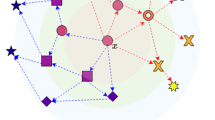Abstract
When having to make a prediction under probabilistic uncertainty in ordinal problems, the median offers a number of interesting properties compared to other statistics such as the expected value. In particular, it does not depend on a particular metric defined over the elements, but still takes account of the ordinal nature of the data. It can also be shown to be the minimizer of the \(L_1\) loss function. In this paper, we show that similar results can be obtained when the uncertainty is described not by a single probability distribution, but by a convex set of those. In particular, we relate the lower and upper medians to the \(L_1\) loss function via the notion of lower and upper expectations (and extend these results to general quantiles). We also show that, using a different decision rule, the lower and upper median can be retrieved when assuming the cost to be strictly monotonic and symmetric, and nothing more. Finally, we run some tests to show the interest of using Median based predictions with convex sets of probabilities in ordinal regression problems.


Similar content being viewed by others
References
Ahn, B., & Choi, S. (2012). Aggregation of ordinal data using ordered weighted averaging operator weights. Annals of Operations Research, 201(1), 1–16.
Angilella, S., Bottero, M., Corrente, S., Ferretti, V., Greco, S., & Lami, I. M. (2015). Non additive robust ordinal regression for urban and territorial planning: an application for siting an urban waste landfill. Annals of Operations Research, 1–30. doi:10.1007/s10479-015-1787-7.
Benavoli, A., & Zaffalon, M. (2013). Density-ratio robustness in dynamic state estimation. Mechanical Systems and Signal Processing, 37(1–2), 54–75.
Berger, J. O. (1985). Statistical decision theory and Bayesian analysis. Berlin: Springer.
Cattaneo, M. E., & Wiencierz, A. (2012). Likelihood-based imprecise regression. International Journal of Approximate Reasoning, 53(8), 1137–1154.
Chu, W., & Keerthi, S. S. (2007). Support vector ordinal regression. Neural computation, 19(3), 792–815.
Corani, G., Antonucci, A., & Zaffalon, M. (2012). Bayesian networks with imprecise probabilities: Theory and application to classification. In D. E. Holmes & L. C. Jain (Eds.), Data Mining: Foundations and Intelligent Paradigms (Volume 1: Clustering, Association and Classification) (Vol. 23, pp. 49–93). Berlin: Springer.
Couso, I. & Sánchez, L. (2010). The behavioral meaning of the median, In C. Borgelt, G. González Rodriguez, W. Trutschnig, M. A. Lubiano, M. Angeles Gil, P. Grzegorzewski & O. Hryniewicz (Eds.), Combining soft computing and statistical methods in data analysis (pp. 115–122). Berlin: Springer.
Couso, I., Moral, S., & Walley, P. (2000). A survey of concepts of independence for imprecise probabilities. Risk Decision and Policy, 5(02), 165–181.
Demšar, J. (2006). Statistical comparisons of classifiers over multiple data sets. The Journal of Machine Learning Research, 9(7), 1–30.
Destercke, S. & Yang, G. (2014). Cautious ordinal classification by binary decomposition, In T. Calders, F. Esposito, E. Hüllermeier & R. Meo (Eds.), Machine learning and knowledge discovery in databases (pp. 323–337). Berlin: Springer.
Destercke, S., Dubois, D., & Chojnacki, E. (2008). Unifying practical uncertainty representations - i: Generalized p-boxes. International Journal of Approximation Reasoning, 49(3), 649–663.
Dubois, D., & Prade, H. (1997). Focusing vs. belief revision: A fundamental distinction when dealing with generic knowledge, In D. Gabbay, R. Kruse, A. Nonnengart & H. J. Ohlbach (Eds.), Qualitative and quantitative practical reasoning (pp. 96–107). Berlin: Springer.
Frank, A., & Asuncion, A. (2010). UCI machine learning repository. http://archive.ics.uci.edu/ml.
Frank, E., & Hall, M. (2001). A simple approach to ordinal classification. In Proceedings of the 12th European Conference on Machine Learning, (pp. 145–156), Springer.
Grabisch, M., & Labreuche, C. (2010). A decade of application of the choquet and sugeno integrals in multi-criteria decision aid. Annals of Operations Research, 175(1), 247–286.
José del Coz, J., & Bahamonde, A. (2009). Learning nondeterministic classifiers. The Journal of Machine Learning Research, 10, 2273–2293.
Koenker, R. (2005). Quantile regression (38th ed.). Cambridge: Cambridge university press.
Kotlowski, W., & Slowinski, R. (2013). On nonparametric ordinal classification with monotonicity constraints. IEEE Transaction on Knowledge and Data Engineering, 25(11), 2576–2589.
Levi, I. (1980). The Enterprise of Knowledge. London: MIT Press.
Levy, H. (1992). Stochastic dominance and expected utility: Survey and analysis. Management Science, 38(4), 555–593.
Li, L. & Lin, H. -T. (2006). Ordinal regression by extended binary classification. In Advances in Neural Information Processing Systems (Vol. 19, pp. 865–872).
Lievens, S., De Baets, B., & Cao-Van, K. (2008). A probabilistic framework for the design of instance-based supervised ranking algorithms in an ordinal setting. Annals of Operations Research, 163(1), 115–142.
Troffaes, M. (2007). Decision making under uncertainty using imprecise probabilities. International Journal of Approximate Reasoning, 45, 17–29.
Uematsu, K., & Lee, Y. (2015). Statistical optimality in multipartite ranking and ordinal regression. Pattern Analysis and Machine Intelligence, IEEE Transactions, 37(5), 1080–1094.
Walley, P. (1991). Statistical reasoning with imprecise probabilities. New York: Chapman and Hall.
Zaffalon, M. (2002). The naive credal classifier. Journal of Probabilistic Planning and Inference, 105, 105–122.
Zaffalon, M., Corani, G., & Mauá, D. (2012). Evaluating credal classifiers by utility-discounted predictive accuracy. International Journal of Approximate Reasoning, 53(8), 1282–1301.
Zopounidis, C., & Doumpos, M. (2002). Multicriteria classification and sorting methods: A literature review. European Journal of Operational Research, 138(2), 229–246.
Acknowledgments
This work was carried out in the framework of the Labex MS2T, which was funded by the French Government, through the program Investments for the future managed by the National Agency for Research (Reference ANR-11-IDEX-0004-02)
Author information
Authors and Affiliations
Corresponding author
Rights and permissions
About this article
Cite this article
Destercke, S. On the median in imprecise ordinal problems. Ann Oper Res 256, 375–392 (2017). https://doi.org/10.1007/s10479-016-2253-x
Published:
Issue Date:
DOI: https://doi.org/10.1007/s10479-016-2253-x




